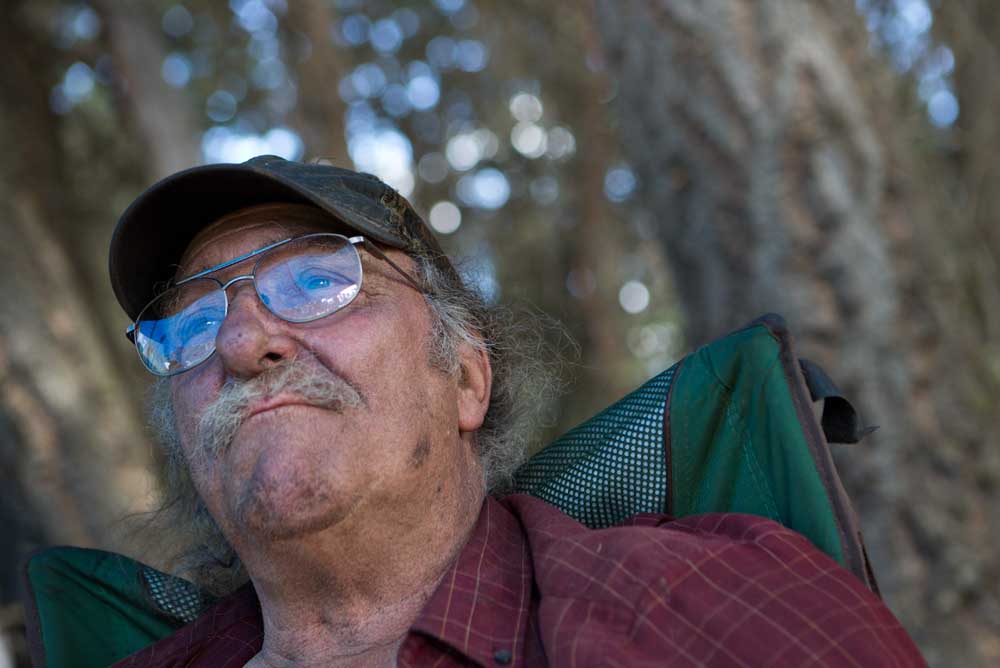Rainbow Family, federal government clash on national forest land
Published 2:58 pm Tuesday, July 11, 2017

- Rainbow Family gathering attendee Gary Stubbs pauses while talking about issues with law enforcement while sitting outside the kitchen where he helps out during the gathering on Thursday, July 6, 2017, in the Malheur National Forest north of Burns. (Joe Kline/Bulletin photo)
JOHN DAY — At around 8 p.m. Thursday, a green and white U.S. Forest Service pickup pulled off a nearby service road and rolled toward the portion of the Malheur National Forest playing host to the latest annual gathering of the Rainbow Family of Living Light.
As the truck cruised past rows of haphazardly parked cars, trucks and buses toward the center of the Rainbow Family’s camp, driving slowly to minimize the dust its tires kicked up on the dirt road, a familiar call went up among the counterculture campers.
“Six up!”
“Six up!”
“Six up!”
The call — a code to notify other members of the Rainbow Family that armed law enforcement had entered the camp — was echoed by dozens of tattooed, dread-locked attendees coming back from the communal dinner at the center of the site, or preparing to leave the area entirely.
The shouts of “Six up!” followed the truck as it passed, a call and response that rippled into the forest toward the setting sun.
Small incidents like this, where members of the Rainbow Family alert the rest of the group to the presence of law enforcement to avoid citations or more serious punishments, were common during the weeklong gathering in Eastern Oregon.
While minor in their own right, they underscore a deeper tension between the colorful group and the Forest Service’s law enforcement staff, known locally as “LEOs.”
That tension was exacerbated during this year’s gathering, when a law enforcement officer shot a dog near the front of the camp.
“We’ve always been angry at the LEOs, because they do something new every year,” said Rainbow Family member Gary Stubbs, who has hosted a kitchen and information center at gatherings since 2000.
The Rainbow Family gathers on National Forest land every July. The gatherings, which can attract up to 20,000 people, draw a diverse crowd, from colorful, bearded old hippies to itinerant teenagers searching for drugs. The gathering itself is sprawling, chaotic, and surprisingly ornate, with various camp kitchens — loosely arranged around a central meadow — providing food for communal dinners. It functions in many ways like a small, temporary city, and Stubbs said it has many of the same problems as many cities, including crime.
“We’re just America, in funny clothes,” he said.
Still, Stubbs and others at the gathering said the Forest Service’s approach to handling that crime is arbitrary and unconstitutional.
The Rainbow Family refuses to seek special-use permits or other types of formal approval, so the gatherings are an unauthorized use of public land.
Kevin Sonoff, public affairs officer with the U.S. Department of Justice’s Oregon office, said the federal government has set up a remote court near the gathering, which can handle petty infractions such as parking issues on Forest Service land, as well as more serious problems. He said the remote court, in Grant County, is the first of its kind in Oregon, but is now standard operating procedure for Rainbow Family gatherings.
Sonoff added that the Forest Service brings in additional law enforcement officials from other districts, using around $500,000 built into its annual budget each year.
The number of additional law enforcement officers, including some wearing body armor and cameras, varies, but typically ranges from 20 to 40, according to Christopher Magallon, a Forest Service officer who was working at the gathering. Magallon, who normally works at the Olympic National Forest in Washington, said officers this year have regularly patrolled the outskirts of the camp, which is about 31⁄2 square miles. They talk to drivers, issue citations and periodically help people who are sick, thirsty or dealing with drug overdoses.
“Our goal here is to keep the peace,” he said.
Sonoff wrote in an email that there were four felony arrests related to the gathering between June 19 and July 5. There were also nine misdemeanor arrests, and 110 violation notices issued. Nearly half of the violations were vehicle-related, and another quarter were drug-related, Sonoff wrote.
While Stubbs acknowledged there are plenty of drugs at the gathering, some of which were openly solicited and received in the community’s trading center, he said it wasn’t all that different from what could be found in any other community in the country. Stubbs added that some of the tickets issued are for infractions like not using a turn signal.
“Getting a ticket at a Rainbow gathering is almost like the cost of admission,” he said.
While Stubbs said the federal response has died down somewhat since the late 1990s, the tension between law enforcement and attendees ratcheted back on June 29, when a Forest Service officer shot a pet pitbull-terrier mix. Marty Heartsong, a Rainbow Family member who saw the shooting, said the dog wasn’t attacking anyone, and claimed the shooting happened within a few feet of children, a story corroborated by others in the camp.
“Those children watched their family dog get shot,” Stubbs added. “This image of cops is going to be in their head for the rest of their life.”
Dave Halemeier, district ranger in the Malheur National Forest, could not be reached to comment on the shooting. Magallon, who arrived on the seen after the shooting, attempted to treat the dog, and took it to a vet, where it needed to be euthanized.
“I offered the best (care) I could to the dog,” Magallon said. “I was with it through the whole process.”
After the shooting, cardboard signs with scrawled messages — “Dog lives matter” and “Paws up, don’t shoot” — appeared around the site. Magallon said attendees greeted him with shouts of “dog murderer” after the incident, but added it gave him an opportunity to talk to more attendees and dispel rumors.
While the Rainbow Family lacks an organized structure or formal leaders, that doesn’t mean it lacks a system for keeping justice. An attendee who went by the name Rhythm, and worked at the Wanna Burn communal kitchen at the gathering, said the community takes an active role in policing itself.
“Around here, there might not be a law, but you might want to listen to a lot of cranky people,” he said.
Stubbs acknowledged that there were some bad apples at the gathering. Stubbs and Heartsong are each part of “Shanta Sena,” an informal peacekeeping group consisting of Rainbow Family attendees. The group, which derives its name from a Sanskrit word meaning “peace army,” oversees infractions ranging from small fights, to rapes and murders in the camp. For large incidents, Stubbs said Shanta Sena will work with the law enforcement officers they claim interfere at the gathering.
“Kill a rainbow, go to prison,” Stubbs said.
— Reporter: 541-617-7818, shamway@bendbulletin.com






